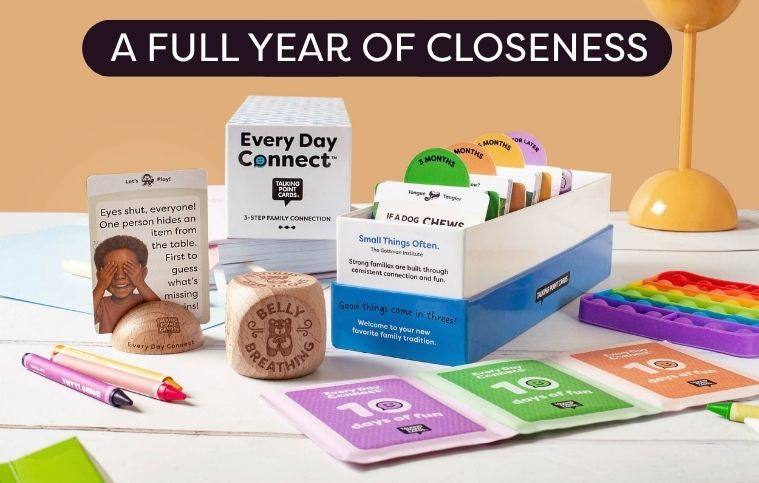SHOP
About
Navigating Difficult Conversations
A Family Guide to Handling Conflict

Families are the fundamental building blocks of society - or so we're told. But let's be real: even the happiest, most loving family units aren't immune to conflict. Disagreements, misunderstandings, and flat-out arguments are par for the course when you've got a bunch of very different people stuck together under one roof.
The good news? Although difficult family conversations are inevitable, they don't have to be feared or avoided. In fact, by learning to navigate them skillfully, you can actually strengthen your family bonds and come out the other side with a deeper sense of understanding and respect for one another.
So grab a cup of tea (or a stiff drink - no judgement here), get comfy, and let's dive into the nitty-gritty of handling those dreaded but oh-so-important difficult family conversations.
Why Are Family Conversations So Dang Hard?

Before we get into the "how" of navigating family conflict, it's worth exploring the "why" - as in, why are convos with our nearest and dearest so often fraught with tension, hurt feelings, and the occasional plate-throwing? A few key reasons:
-
Deep-rooted histories and baggage: Whether it's childhood rivalries, old grudges, or just years of built-up quirks and resentments, families tend to carry a lot of emotional weight into every interaction. It's like showing up to a meeting weighed down by suitcases full of past grievances.
-
Differing values and perspectives: Even in the closest families, there are bound to be clashing viewpoints on everything from politics and religion to child-rearing and what constitutes an acceptable bedtime. These differences in core values can make finding common ground monumentally difficult.
-
Fear of judgment or rejection: At the end of the day, most of us want our families to understand, accept, and love us unconditionally. So we often approach difficult conversations with a degree of vulnerability and self-protection that can sabotage open and honest dialogue.
Whew, it's no wonder family talks so often go awry! But don't lose hope just yet - there are strategies for navigating these uniquely challenging dynamics.

Setting the Stage for Success
Like any high-stakes operation, a key part of having a productive difficult family conversation is proper planning and preparation. Here are some tips for stacking the deck in your favor from the get-go:
Create a Safe, Judgment-Free Zone
One of the biggest obstacles to honest family dialogue? The fear of being judged, criticized, or rejected by our loved ones. So before you even broach a touchy subject, it's crucial to establish an atmosphere of openness, compassion, and (temporary) judgment-free zones.
This could mean laying some mutual ground rules, like:
-
No personal attacks or insults
-
Make an effort to listen without interrupting
-
Speak for yourself using "I" statements, not accusatory "you" statements
-
Agree to take breaks if tensions run high
It also doesn't hurt to pick a relaxing, neutral setting - not a childhood bedroom laden with emotional baggage, but maybe a park or a cozy cafe. The goal is to create a safe container where everyone feels free to be vulnerable.
Start with Positives and Gratitudes
Okay, I know what you're thinking: "How am I supposed to find positive things to say about Uncle Larry when the whole reason we need to talk is because he's been drinking my expensive wines and leaving the bottles in the downstairs bathroom?" Fair point. But hear me out.
By making an intentional effort to connect over some positive affirmations before diving into the hard stuff, you'll help disarm defenses and remind everyone that you're on the same team. Maybe you thank your mom for always being there for you when you were sick as a kid. Or express gratitude toward your brother for watching your dog that one time. The specifics don't matter as much as setting a tone of goodwill and shared humanity. These momentary bright spots can provide much-needed buoyancy when the inevitable difficult currents arise.
Conversation Starter Cards / Prompts
Sometimes the hardest part of a difficult conversation is simply getting it started. Staring into each other's eyes in tense silence is a sure-fire way to ramp up the awkwardness and make an unpleasant situation even worse.
That's where conversation starter cards or prompts can come in handy. These are essentially thought-provoking questions or hypothetical scenarios designed to kick-start meaningful dialogue in a lower-stakes way. A few examples:
-
"If you could have any family superpower, what would it be and why?"
-
"What's one thing you appreciate about each person here?
-
"What life dream or goal are you most excited about right now?"
The idea is to use these prompts as icebreakers to loosen everyone up, build camaraderie, and establish a pattern of back-and-forth conversation before segueing into meatier subjects. Just don't get so distracted by the prompts that you avoid the real issues!
Key Strategies for In-the-Moment Conflicts

Okay, you've set the stage for as constructive a discussion as possible. But once you're in the thick of a heated family disagreement, how do you keep it from derailing into a soul-crushing, relationship-damaging hostility-fest? Try implementing these in-the-moment strategies:
Use "I" Statements and Avoid Blame
When we get angry or defensive, it's easy to start making accusing "you" statements that put others on the defensive: "You're so selfish!" "You never think about how your actions affect others!" Et cetera. But these kinds of statements - however justified they may feel in the heat of the moment—rarely lead anywhere productive. They just breed further conflict and resentment.
Instead, try phrasing your grievances as "I" statements that communicate how the other person's actions made you feel without assigning blame. For example: "I felt really hurt and disrespected when you didn't show up for my birthday party" rather than "You're a thoughtless, terrible person for missing my birthday." The former allows you to express your perspective without attacking the other person's
character. And when you take ownership of your feelings, it disarms defensiveness.
Make an Effort to Understand Differing Perspectives
In any conflict, there's your truth, the other person's truth, and somewhere in between lies the actual, objective reality of what occurred. But we're all inescapably biased by our own subjective experiences and viewpoints, which can make those differing "truths" feel incompatible and irreconcilable.
The key, then, is to practice stepping outside your own entrenched perspective and making a real effort to understand where the other person is coming from—their motivations, their thought process, their lived experiences that shape their worldview. This takes conscious effort. Maybe it means asking open-ended questions to further your understanding: "Help me understand why you feel that way." Or repeating back what you think the other person's stance is: "It sounds like what you're saying is X, but correct me if I'm misunderstanding..."
It also means resisting the urge to prepare your rebuttal while the other person is talking. Because once you've decided you know their perspective, you've stopped actually listening. The aim? To create an environment of mutual validation where both parties feel heard and understood, even if you still disagree. That shared humanity is what allows real progress.
Take a Break If Needed
Look, sometimes we all get pushed past our limit and every rational inclination flees out the window. When tensions are at a fever pitch, voices are escalating, and the same hurtful points keep circling with no resolution, it's okay to call a timeout. By recognizing your own signs of overwhelming frustration or anger—shortness of breath, muscle tension, rising desire to say something you'll regret—and calling for a break before you reach the point of no return, you can prevent a difficult conversation from devolving into a gruesome emotional bloodbath.
During a break, get some physical space and give everyone a chance to cool off, recenter, and regroup with a fresh perspective. Go for a walk, meditate, phone-a-friend for some outside perspective. Just don't use the break to start mentally scripting your comeback zingers—that's not terribly conducive to conflict resolution.
When you reconvene, you can re-establish your ground rules and the intention to approach the conflict from a calmer, more grounded place. This timeout strategy works wonders for hitting the reset button on a conversation spiraling out of control.

Find the Nuggets of Truth and Compromise
Even in the most acrimonious family fights, there are usually some grains of validity to each person's perspective. The hard part is identifying those nuggets of truth amidst all the emotional chaff and reactivity.
As you're listening with open-minded curiosity to differing viewpoints, try to sift through and find the pieces that you can genuinely empathize with or agree on. Maybe your brother's complaint about your chronic lateness actually rings true on some level. Or your dad's stance on tough-love parenting stems from wanting to raise self-sufficient kids.
Whatever the issue, look for those nuggets where your underlying values, intentions, or lived experiences overlap with the other person's. Validate those spaces of alignment out loud: "You know what, you're right that I do have a problem with punctuality..." or "I can
understand where you're coming from wanting us to be independent..."
Then, once you've established that shared ground, you can start exploring potential compromises or solutions that honor everyone's core needs and humanity. The willingness to incorporate each party's truth into the final resolution is what ultimately cultivates mutual acceptance and healing.
Use Humor Cautiously
They say laughter is the best medicine, but in the midst of a heavy family conflict, ill-timed humor can easily come across as belittling or diminishing the issue's importance. However, a few well-placed quips or self-deprecating jokes can be invaluable tension-diffusers when the atmosphere grows too fraught. The key is reading the room and deploying levity judiciously - your goal isn't to make light of the subject itself, but simply to momentarily lift the veil of severity surrounding it.
A comment like "Well, this is already going about as well as our Griswold family vacation to Wally World..." gives everyone momentary permission to share a laugh, relieve pent-up stress, and reorient with a little more ease and goodwill. Just know when to cut the comedy
short and refocus.
Implement Active Listening Techniques
In the heat of conflict, we're often so busy formulating our next retort that we fail to actually hear and absorb what the other person is saying. That's where active listening skills come into play. Tactics like:
-
Maintaining relaxed, open body language
-
-
Nodding and making affirmative noises ("mm-hmm," "I see," etc.)
-
-
Periodically paraphrasing key points ("So it sounds like you feel...")
-
-
Asking clarifying questions
...can all demonstrate that you're fully engaged and working to understand, rather than just
waiting for your turn to make your point.
It takes practice, but mastering active listening creates a positive loop where each party feels heard and respected, making them more inclined to extend that courtesy in return. It's how you cultivate the mutual empathy required for real conflict resolution.
Acknowledge When Outside Help Is Needed
Despite our best laid plans and de-escalation efforts, some familial conflicts prove too entrenched, too emotionally charged, or too psychologically complex to resolve through family discussions alone. And there's no shame in admitting when you've reached the limits of what you can effectively handle yourselves.
From seeking couple's counseling to unlock pernicious communication patterns, to engaging a professional mediator to facilitate tough negotiations around inheritance ore property divides, to simply processing unresolved childhood trauma with a seasoned family therapist—knowing when to loop in outside support is often the wisest path.
The key is, nobody has to "win" or "lose" by getting an objective third-party involved. It simply provides a fresh perspective and structured process for working through the sticky situations that have proven intractable through your own efforts so far.
The Art of Choosing Your Battles
Chances are, you and your family members have accumulated countless underexplored resentments, pet peeves, and differing expectations over the years. And as tempting as it may be to lay it all out on the table in one heroic truth bomb, that's a surefire recipe for emotional armageddon.
Wise families learn to become judicious in choosing which battles to fight and when. Ask yourself:
-
How fundamental is this issue to my core values and well-being?
-
Is there potential for change or compromise?
-
How has bringing it up in the past impacted family dynamics?
-
Is this really the right time and context?
Not every slight and disagreement warrants a capital-C Conversation. Sometimes the healthiest route is to live with a degree of understandable human imperfection. Real mutual growth opportunities tend to reveal themselves when you take a discerning approach.
Protecting Your Boundaries
On the flip side of choosing your battles, there's the necessity of sticking firm to your boundaries once a respective line has been drawn. Because even in the closest of families, there are certain ethical lines that shouldn't be crossed—from respecting personal autonomy and key life choices, to maintaining physical and emotional safety.
If a family member repeatedly violates a clearly established boundary after you've made efforts at understanding and resolution, you may eventually need to limit or terminate contact, as painful as that possibility may be. Because sacrificing your own mental or personal wellbeing in service of compulsory family unity helps no one in the long run.
Standing firm on your boundaries isn't an act of selfishness or meanness. It's an act of self-preservation and demanding the respect you fundamentally deserve—from your family most of all. Though ideally, it never reaches that scorched-earth point if you've cultivated a baseline of empathetic communication.
The Long Game of Family Communication
Perfecting the art of navigating difficult family conversations isn't something that happens overnight. It's a lifelong journey of practicing self-awareness, learning the art of making space for multiple perspectives, and prioritizing compassionate honesty above hollow superficial niceness.
Even families that become relatively masterful at it will still have blow-up fights, hurtful comments, conversational train wrecks. That's the inherent messiness of trying to continually renegotiate the ever-evolving dynamics and needs within a collection of imperfect humans.
But the real measure of success isn't a scoreboard of resolved conflicts. It's the ability to keep showing up for one another, to keep making the effort to bridge divides. To keep holding onto the simple truth that at the end of the day, these are the people who shape us most profoundly - for better and worse.
As frustrating and complex as family communication can be, it's always worth the wince-inducing labor of working through it. Because the alternative—of living disconnected, uncomprehending lives—is far lonelier.
Conclusion
Mastering difficult family conversations is no easy feat. There will be missteps, small regressions, and moments where you wonder if the Herculean effort is really worth it. But pushing through that resistance is what real familial growth and understanding hinges upon. Because at the end of the day, your family is quite literally irreplaceable. These are the people who knew you before you knew yourself, who watched you evolve from screaming infant to complex adult in all your contradictions. They carry expansive wells of shared history, treasured memories, inside jokes and heaping portions of unconditional love - even when circumstances make that love difficult to externalize.
By committing to having those difficult conversations, by fighting to understand one another's perspectives, by making space for productive disagreement and compromise, you're building something immensely valuable: a foundation of mutual respect, hard-won maturity, and resilient connection that can whether any storm.
Yes, it will sometimes feel like wading through a heaving sea of complex emotions, of long-harbored triggers and tender vulnerabilities. Your voice may shake and tears may flow. But that's okay—in fact, that's normal. That's the messy beauty of true intimacy, of caring deeply enough about one another to have the courage to work through conflict.
So keep showing up,amily. Keep making the effort, Even when it's hard. Draw strength from your shared roots. Nurture new, flexible branches. And trust that cultivating these skills - of empathetic listening, boundary-setting, compromise—will enable you to grow together in
unexpected, wonderful ways.
Because in this wildly imperfect journey of life, those familial ties are the closest thing we'll ever have to an anchor in the storm. Nothing worthwhile was ever won without a fight. The difficult conversations are simply how we fortify what matters most.
LIKED THIS ARTICLE?
SIGN UP FOR MORE!






